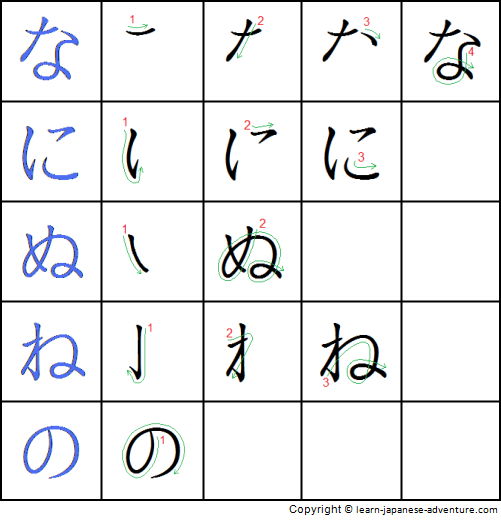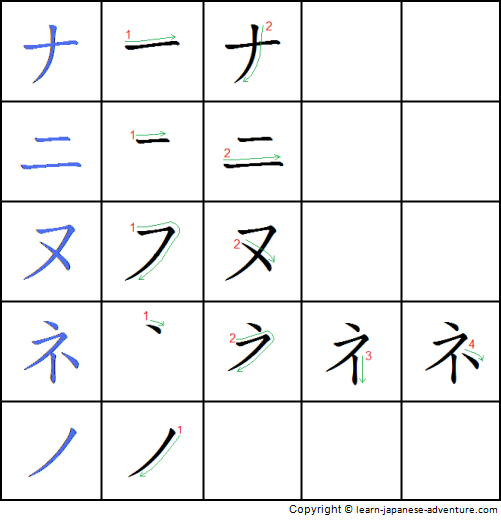
Na Adjectives Japanese Japan 24 Hours
JLPT N5 Na-Adjectives List. This is a Japanese vocabulary list of な-adjective(s) you need to know in order to pass the JLPT N5. Click on any of the words below to see the full vocabulary lesson, including example sentences. References: Full JLPT N5 vocabulary list. JLPT N5 Study Guide. N5 い-adjective list. N5 Adjective list (all types).

How to Pronounce Na Ni Nu Ne No Japanese Pronunciation YouTube
Hiragana is used in many cases, such as writing articles or miscellaneous words that have no kanji form or an obscure kanji form. With the following visual stroke-by-stroke guide, you will learn to write hiragana characters な、に、ぬ、ね、の (na , ni, nu, ne, no). 02. of 07.

How to write 名 (na) How to Write Kanji 54 YouTube
There are two types of adjectives in Japanese: i-adjectives and na-adjectives. The type of adjective is determined by its ending or—more precisely—the grammar that is required to join the adjective to nouns or transform the adjective into an adverb.

Learn Hiragana The Ultimate Guide.
Na (hiragana: な, katakana: ナ) is one of the Japanese kana, which each represent one mora.The hiragana な is made in four strokes, the katakana ナ two. Both represent [na].な and ナ originate from the man'yōgana 奈. な is used as part of the okurigana for the plain negative forms of Japanese verbs, and several negative forms of adjectives.

JLPT N5 Grammar なあ/な (naa /na) particle meaning
な な U+306A, な HIRAGANA LETTER NA ← ど [U+3069] Hiragana に → [U+306B] Contents 1 Japanese 1.1 Pronunciation 1.2 Etymology 1 1.2.1 Syllable 1.2.1.1 See also 1.3 Etymology 2 1.3.1 Interjection 1.3.2 Particle 1.3.2.1 Usage notes 1.4 Etymology 3 1.4.1 Particle 1.4.1.1 Usage notes 1.4.1.2 Descendants 1.5 Etymology 4 1.5.1 Particle 1.5.1.1 Usage notes

JLPT N4 Grammar な (na) Meaning
Japan View All Japan More Series Travel Reviews Interviews Podcast Search な-Adjectives Adjective Form な-adjectives are one type of adjective in Japanese. Their main function is to describe nouns, but many can function as nouns themselves. Table of Contents The Basics Present Tense Past Tense Negative な-adjectives

Na Adjectives Japanese Japan 24 Hours
1 Answer Sorted by: 48 な at the end of a sentence usually gives the sentence one of the following five meanings. 1. Seeking confirmation This usage is probably the most common.

Japanese Hiragana writing Na な with stroke order and pronunciation YouTube
Na-Adjectives in the Past Tense. In order to conjugate na-adjectives into the past tense, you simply leave out the な and add either だった (datta) for casual sentences, or でした (deshita) for formal sentences. The table below shows how to conjugate na-adjectives into the past tense. The word before the slash (だった) is used for.

Na Japanese
1) When you express your opinion or feeling. (Both women and men use). In this usage, we tend to stretch the sound なあ ( = naa)/ (more colloquial way to write) な~ ( = naa) You use the suffix ね ( = ne) when you ask for agreement from a listener. Ex. これ、おいしいね。 = Kore, oishii ne. = This is delicious, isn't it?

NA. (Japanese character) [ Learn Japanese Words with Pinterest by ] Learn
Japanese adjectives are categorized into two: な-adjectives and い-adjectives. Their main function is to describe nouns, but these adjectives can also be transformed into nouns themselves. The easiest way to separate な-adjectives and い-adjectives is by checking the adjective's ending. More precisely, if the word ends with い or not.

hiraganaletterna Japanese Language
な is a specialized predicate that you use with な adjectives (and in a few other situations). It means the same thing です means. There are historical reasons you use な instead of other stuff you'll learn later. The reason I'm calling it a predicate will make more sense later and matters more for grammar you learn later on.

Guide to Japanese Adjectives Na (な) and I (い) Adjective Coto Academy
な or の: The Middle of the Spectrum 〜な気分 For When You're in a Mood For Cravings For Self Expression For Places and Activities 終わりな気分 Prerequisites: This article assumes you already know hiragana and katakana. If you need to brush up, have a look at our Ultimate Hiragana Guide and Ultimate Katakana Guide.

Learning Japanese Katakana Letter ナ
Neutral 〜な for Indirectly Referring to Past Speech The Basics Without any softening elements, 〜な is a very strong way to tell someone not to do something. For example, if a police officer spots a thief and orders him not to move, they may use 〜な to give him a stern command, such as: 動く な ! Don't move!

Write Japanese Hiragana
Meaning of na in Japanese Words Definition of na な na 【 菜 】 菜 Kanji Details ( n) greens; vegetables rape (Brassica napus); rapeseed しち shichi · なな nana · な na 【 七 · 7 】 七7 Kanji Details ( num) seven 私は今朝七時に起きた。 I got up at seven this morning. ( pref) hepta- な na 【 名 】 名 Kanji Details ( n) name; reputation な na 【 儺 】 儺 Kanji Details

Writing Japanese Katakana
Learn Japanese grammar: なあ (naa). Meaning: a sentence-ending particle that can used to express the following: ask for confirmation from listener (…right?) express hope (it'd be nice if…) express admiration (wow…) express uncertainty (I wonder…) add general emphasis to what is being said

Kanji Lessons【14】How to write "女"(onna) in kanji. YouTube
1. Two main types of adjectives In this post, we will introduce the two main types of adjectives in Japanese and explain how to tell which adjective is which type. If you need just a quick review, please scroll down to the Summary Table with a blue title in Section 8. In Japanese, we use an adjective with mood and tense.